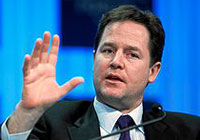
Clegg warns UK risks sliding to EU exit
London, November 1, 2012
Britain faces a crisis that could end with the world's sixth largest economy leaving the European Union, Deputy Prime Minister Nick Clegg warned ahead of a showdown over budget spending with other states in the 27-member bloc.
A day after Prime Minister David Cameron was defeated in parliament for not demanding a cut to the EU budget, Clegg said on Thursday that the behaviour of the rebel lawmakers could leave Britain isolated in the EU or outside it altogether.
"You will never achieve (anything) by stamping your foot and saying, 'Well we want to be part of this club, we want to unilaterally rewrite the rules of the games, and we want to pick and choose unilaterally what we sign up to,'" said Clegg, the leader of the pro-European Liberal Democrats, the junior party in Cameron's coalition government.
"My worry is that it is a much shorter leap from that to an outright crisis which would leave the United Kingdom fully marginalised or even out of the European Union than people seem to imagine," Clegg said.
In a sign of the infighting over Europe at the top of the government, Clegg spoke an hour after finance minister George Osborne warned that Britain would veto any deal on the budget that would be bad for the UK taxpayer.
The EU's 1 trillion euro ($1.3 trillion) long-term spending plan has become the focus of a wider debate in Britain about the benefits of membership of the union, just as the subset of members in the single currency zone attempts to fight its long-running debt crisis with closer integration.
"People are outraged when they see money being wasted in Europe," Osborne, the 41-year-old Cameron ally, told the BBC.
"Britain has become more Eurosceptic over my lifetime."
Cameron, who wants the EU's long-term budget to rise only in line with inflation, has tried to appease the hardline eurosceptics in his party by saying he will seek a new settlement on ties with the EU and then put it to voters in a referendum.
The 46-year-old leader says Britain should stay a member of its biggest trading partner, but some bankers and investors have warned that the referendum gamble could backfire, given the public's distrust of the European agenda.
The rebellion within the Conservative Party will also revive uncomfortable memories for Cameron of the part European divisions played in the downfall of the party's last two prime ministers, Margaret Thatcher and John Major.
The opposition Labour Party's decision to vote with the rebels could lock Britain's two main parties into a spiral of euroscepticism ahead of the next general election, due in May 2015.
VETO TIME?
The defeat in parliament will push Cameron into taking a tough position when he joins other EU leaders for a summit on the budget in Brussels on November 22-23.
"We want a cut in the EU budget," Osborne told BBC Radio 4. "We are at the beginning of a negotiation. Let us see where that negotiation leads."
He would not be drawn on whether he thought securing such a cut was possible or not.
"No one should doubt David Cameron's determination, my determination to deliver a deal that is good for the taxpayer and that puts an end to outrageous increases in European spending," Osborne said.
Osborne talked past a question on whether the Conservative Party was out of control over Europe but said Wednesday's defeat in parliament meant the government had to listen to lawmakers.
"We will only put a deal to the House of Commons that we think the House of Commons will accept," he said.
"If it comes to a vote ... the House of Commons will face a choice: you either accept the deal or you accept no deal. Now no deal doesn't mean there is no spending in Europe; it means you go to these annual budgets in the European Union." - Reuters







